Setting up an online storefront has never been easier. One of the cheapest ways to start your first e-commerce site is through open source. Choosing a perfect e-commerce platform means starting your own shed! These open source e-commerce platforms can offer flexibility, customization, and a community of support to make your online business become a reality.
And if you have a bit of technical knowledge or if you can hire a good developer then these platforms can provide you the ultimate solution to build your business online or help you provide an excellent service to your customers.
In this article, we are going to explain what open source e-commerce is and introduce the 12 best open source e-commerce platforms.
Let’s get started!
What is Open Source eCommerce?
Open Source eCommerce platforms allude to online store programming whose source code is free for any person to view, alter, and appropriate. This implies that you can tailor the stage to your particular needs without paying for licenses. Open source e-commerce solutions quite often have dynamic networks of engineers that add to further improving the product and making helpful add-ons.
You may like: E-commerce website builders
Ways to Choose the Right Open Source E-commerce Platforms
The success that is eventually to be showered on your online business is highly dependent upon your choice of an open-source e-commerce platform. Some of the main factors one should consider are:
1. Usability: Go for a platform that has a user interface that is not complex and does not require an individual to know much information regarding technical stuff.
2. Customization options: One should ensure that the platform offers an easy way to change the design and functionality to fit with the brand.
3. Scalability: Opt for a solution that can grow your business and is always ready to handle an increased number of traffic and sales.
4. Payment Gateway Integration: Check whether the platform supports popular modes of payment or gateways.
5. Mobile Responsiveness: Ensure the software builds mobile-friendly shops since most customers shop using their phones.
6. SEO Features: It should have built-in SEO features to help your store rank better in search engines.
7. Security: Ensure the platform is secure enough to protect your store data and customer information.
8. Community and support: The bigger the community and its activities, the better for you as you can always put in a request and will most likely get somebody or resource that can help you out.
Advantages of Open Source E-Commerce Platforms
1. Cost-effective: Free to download and use; this slashes off many of the initial startup or set-up costs.
2. Customization: The source code is open, and therefore extensive modifications are possible.
3. Flexibility: For use in tweaking the platform to suit some particular business needs and requirements.
4. Community support: It offers large user bases all support along with resources and troubleshooting.
5. Active communities: It leads to more frequent improvements and bug fixing, meaning you always work with the latest and best.
6. No vendor: lock-in means the freedom to switch hosting providers and developers any time you wish.
7. Scalability: The majority of the available platforms are capable of growing your business without the necessity of serious restructuring.
8. Innovation: Leverage the latest community-driven features.
12 of the Best Open Source E-commerce Platforms
1. WooCommerce
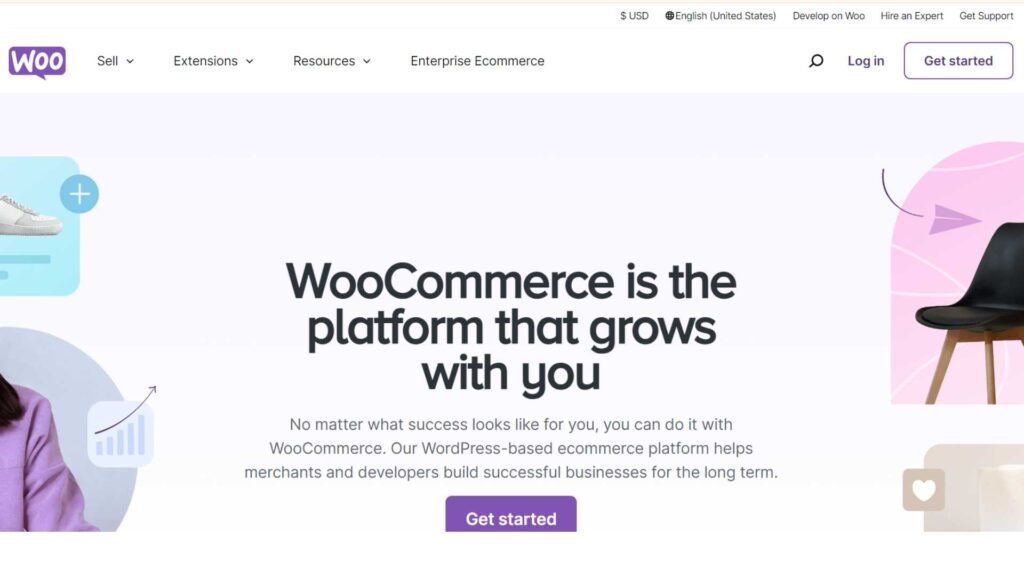
WooCommerce is an open source e-commerce plugin for WordPress that now powers millions of online storefronts worldwide. It is seamlessly integrated with the intensely popular WordPress blogging platform, meaning that you can sell directly from your existing WordPress site.
It features a clean user interface, which makes it very easy for beginners to set up their online shops. In a nutshell, from themes and plugins, this platform offers a host of customization options to differentiate your store and make it aligned with your brand identity.
Key Features:
- Integration with WordPress
- Rich plugin ecosystem
- Customizable checkout process
- Support for payment gateways
- Easy to use and configure
- Big community and has great documentation
- High level of customization
Suitable for:
- The small to middle-level business,
- also for those who are already using WordPress
Pricing: Free, but with some expense items on premium themes and plugins
You may like: E-commerce Payment Gateways
2. Magento

Magento is a powerful open-source e-commerce platform recognized for scalability and flexibility. With a strong set of must-have features, it suits probably any business, from small startups to large enterprises. Magento provides enhanced marketing features, inventory management, and multi-store functionality out of the box.
Its architecture allows for deep customization and integration with third-party systems. Magento’s admin panel provides full control over all the aspects of your online store.
Key Features:
- Advanced product management
- Supports multiple stores and multiple languages
- Strong marketing and promotion tools
- With a broad API, many integrations can be built
- Highly scalable and highly flexible
- Strong features of security
- A big ecosystem of extensions
Suitable for:
- Medium to large-sized businesses,
- enterprise-grade
Pricing: Free Magento Open Source, paid options available up to Magento Commerce
Suggested Read: Magento Hosting
3. VirtueMart
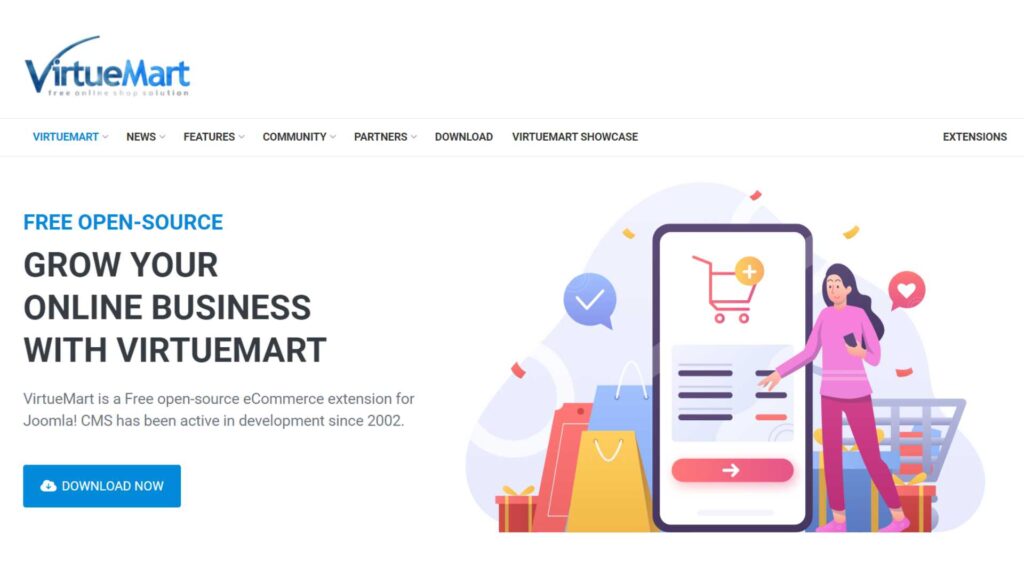
VirtueMart is a free open source e-commerce solution made from an extension developed for the Joomla content management system. It provides full functionality to create and administer online stores within Joomla.
VirtueMart is characterized by its multi-functionality for user-friendly product management, order processing, and customer interactions. It supports different languages and currencies, so it fits well for international e-commerce.
Key Features:
- Tight Joomla integration
- Multi-vendor support
- Flexible product attributes and variations
- SEO built-in
- User-friendly for Joomla users
- Highly customizable
- Community support
Suitable for:
- Small to medium-sized business,
- Joomla users
Pricing: Free, some extensions extra
4. Spree Commerce
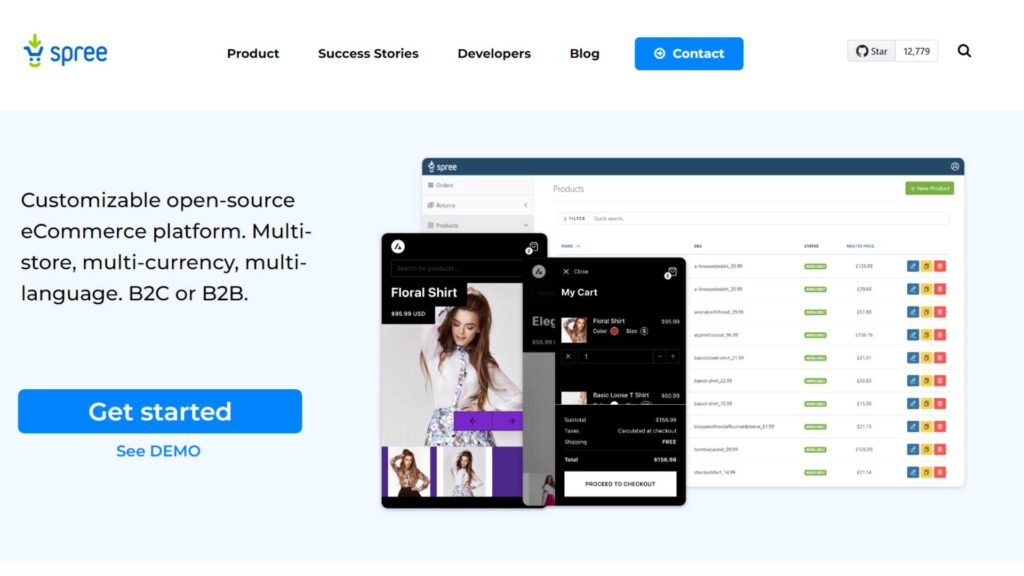
Spree Commerce is a flexible, open source e-commerce platform built on Ruby on Rails with a modular architecture for customization and an easy way to maintain it. Spree Commerce has an easy-to-use and clean admin interface for products, orders, and customers.
Sustains multi-store configuration and strong inventory management. An API-first structure makes Spree easy to use in integrating with other systems and developing headless commerce solutions.
Key Features:
- Modular architecture
- API
- Multi-store
- Flexible product options and variants
- Highly customizable
- Good performance and scalability
- The active community of developers
Suitable for:
- Medium to large businesses,
- Ruby on Rails developers
Pricing: Free (there are hosting and development costs)
5. OpenCart
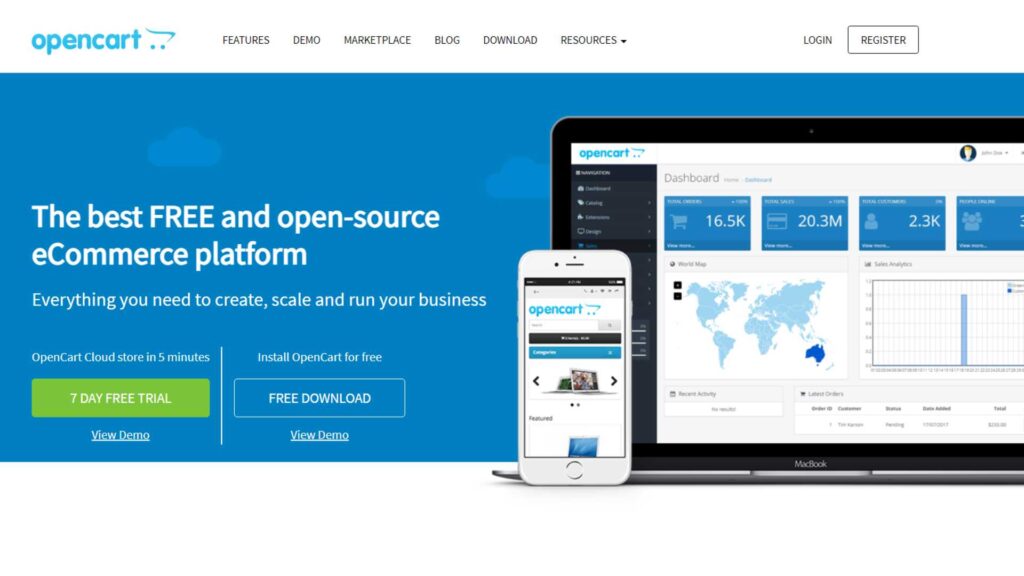
OpenCart is a lightweight user-friendly e-commerce platform with an open source that comes rich out of the box. With an intuitive Admin panel to manage your products, customers, and orders, you will always find it easy to approach e-commerce without having much technical knowledge.
The app supports multiple languages and currencies, letting you scale easily to foreign markets. With many themes and extensions available, the platform can personalize the appearance of your storefront.
Key Features:
- A friendly admin interface
- Support for multi-store
- Extensive marketplace for extensions
- Native SEO functionality
- Easy to install and use
- Lightweight for server
- Extensive community, support is available
Suitable for:
- Small to middle business,
- beginners
Pricing: Free (certain themes and Extensions are premium)
6. PrestaShop
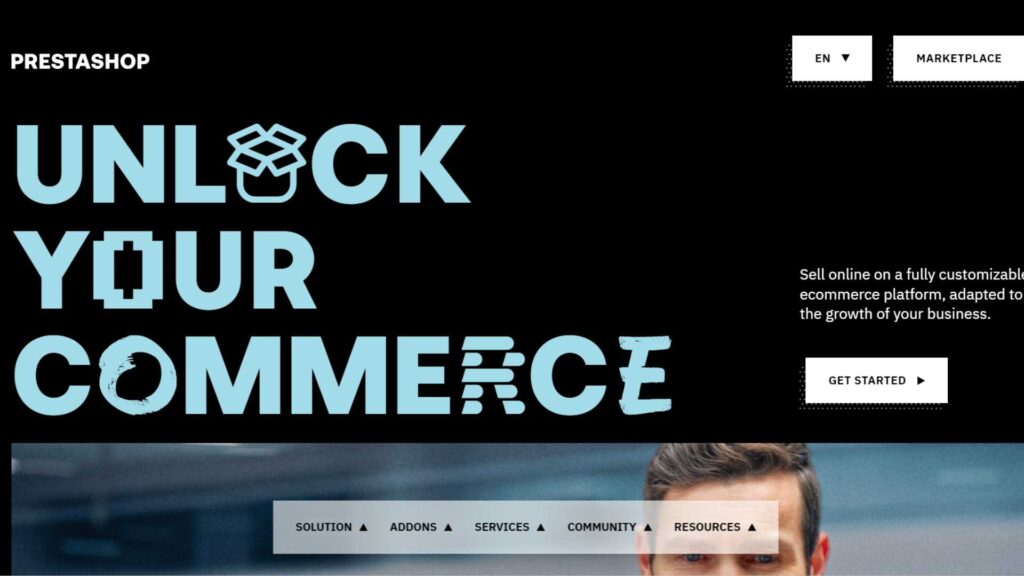
A rich-in-features, open source e-commerce solution that gives the right to reach an excellent harmony between being highly comfortable in usage and providing ultimate functionality for online retail. The admin panel here is sleek and straightforward to handle products, orders, and customers. It comes with a great number of built-in features, like inventory management systems, marketing tools, and analytics.
Key features:
- include comprehensive product management,
- inbuilt marketing and SEO tools,
- a customizable checkout process, and
- an extensive add-on marketplace.
- include that it is feature-rich out of the box,
- has an active community and regular updates,
- here is a good mix of usability and features.
Suitable for:
- Small and medium-sized businesses.
Pricing: It’s free. There are some additional costs for a few themes and modules
7. Saleor

Saleor is a modern, GraphQL-first, flexible, and high-performance e-commerce solution. It is crafted with Python and the Django framework and has a headless approach, enabling it to smoothly integrate with varying frontend technologies.
It comprises a clean and intuitive dashboard of the platform with which products, orders, and customers can be managed. It has an API-centric approach to creating custom e-commerce experiences across multiple channels. The multi-language and multi-currency setup is supported in the platform, allowing you to expand internationally.
Key Features:
- GraphQL API
- Headless architecture
- Built-in PWA storefront
- Flexible product attributes
- Modern tech stack
- High-performance and scalability
- Great customization for e-commerce
Suitable for:
- Medium to large businesses,
- developers looking to implement a modern e-commerce platform
Pricing: Free, hosting and development at a cost
8. NopCommerce

NopCommerce is an open source e-commerce platform that is feature-rich in its category, based on ASP.NET Core. It can be used to create and manage full-featured online stores with multi-store support, product management, and marketing tools.
NopCommerce offers an easy-to-use admin interface for administering every aspect of your online store. Multiple languages and currencies are supported by the platform, which makes it perfect for international e-commerce.
Key Features:
- Multi-store and multi-vendor support
- Built-in blog and forum
- Mobile-friendly responsive design
- Extensive discount and promotion tools
- Rich set of features out-of-the-box
- Good performance and scalability
- Regularly updated and has an active community
Suitable for:
- Small to large businesses,
- .NET developers
Pricing: Free (additional costs for some plugins and themes)
9. Sylius

Sylius is a modern open-source e-commerce platform based on the Symfony framework. Being flexible and modular in its architecture, it extends desired customization and functionality easily. Have a clean, intuitive admin interface to manage products, orders, and customers.
API first approaches make an easy fit with creating headless commerce solutions and integrating them into other setups. Sylius is a multichannel selling platform where several stores are controlled through one single backend.
Key Features:
- Modular architecture
- API-first approach
- Multi-channel sales support
- Flexible product and order management
- Highly customizable
- Modern technology stack
- Great developer experience
Suitable for:
- Medium to large businesses;
- Symfony developers
Pricing: Free, with hosting and development costs applied
10. OsCommerce

OsCommerce is the oldest open source e-commerce platform; it has been running online stores for quite a long time. This tool features a quite simple approach to developing and managing a commerce site.
This is why a lot of users with less technical skills find it very approachable. OsCommerce offers basic modules required in product management, order processing, and customer relationships. It comes with a large user community that has created several add-ons and customizations for the platform over the years.
Key Features:
- Easy management of products and categories
- Integration with multiple payment gateways
- Customer reviews and ratings
- Newsletter management
- Setup and usage are pretty easy.
- Large add-on library
- Strong, growing community user base
Suitable For:
- Small businesses,
- beginners
Pricing: Free (but additional add-ons can result in extra charges)
11. Zen Cart
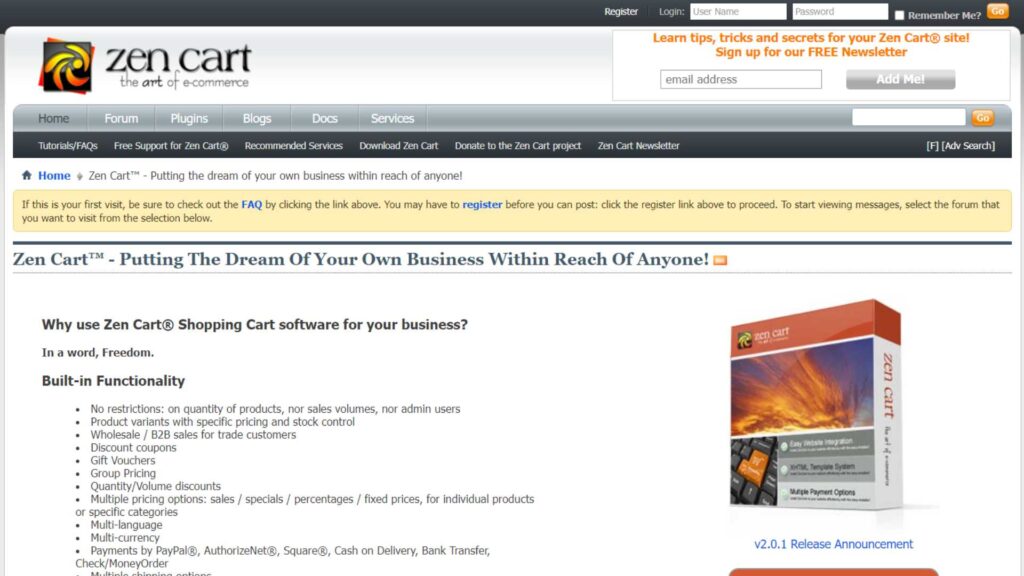
Zen Cart provides a free, open source shopping cart software designed for e-commerce merchants who search for effective solutions to reach their customer base safely. It offers effective management of products, orders, and customers all included.
Zen Cart offers a templating system for anyone who wants to make the look of their shop more personal without getting into too deep a knowledge of coding. The platform allows trade in multiple languages and different currencies, thus it is suitable for international e-commerce.
Key features:
- Native security features,
- custom product attributes,
- multiple integrations with payment gateways,
- gift certificate, and coupon support.
- strong security,
- easy to use even for newbies,
- active community support.
Suitable for:
- small and medium-sized businesses.
Pricing: Free, plus a couple of free and premium templates and several free and premium add-ons.
12. Drupal Commerce

Drupal Commerce is an open source e-commerce framework built on top of the Drupal content management system. This brings about very flexible and customized ways of constructing e-commerce websites of high complexity.
Drupal Commerce leverages all of Drupal’s strong content management capabilities, making it very easy to integrate e-commerce functionality with your present Drupal site. This platform provides advanced features for product management, order processing, and customer interactions.
Key Features:
- Truly integrated with Drupal CMS Platform
- Flexible product and order management
- Sophisticated content management features
- Extensive API for integrations
- Highly customizable and
- Large developer community
Suitable for:
Medium to large businesses, Drupal developers
Pricing: Free (Hosting and development costs are applicable)
Conclusion
Open source e-commerce platforms of the modern age have made various conveniences a matter of opportunity for the business size. It ranges from intuitive solutions like WooCommerce and OpenCart to more professional ones like Magento and Drupal Commerce—to suit every purpose.
Choosing the right open-source e-commerce platform that will fit your business goals, aligning to your specific needs and techno-ability, then you are good in stock for a longer period.
FAQs
1. Are e-commerce open-source free?
Although the core software is free, there could be high-end costs for hosting, themes, plugins, and development work.
2. Do I have to know how to code to get around on an open-source e-commerce platform?
Although entry-level platforms, like WooCommerce or OpenCart, require the least amount of coding skills, higher-end ones may require technical acumen.
3. Can a high-traffic store run on any of the open-source platforms?
Yes. Most open-source platforms, like Magento or Drupal Commerce, are built in a way that they can handle high traffic and large operations.
4. Is it safe to make use of open source ecommerce platforms?
The majority of open source platforms are secure if well-maintained and updated. Always follow best security practices and keep your software up to date.



